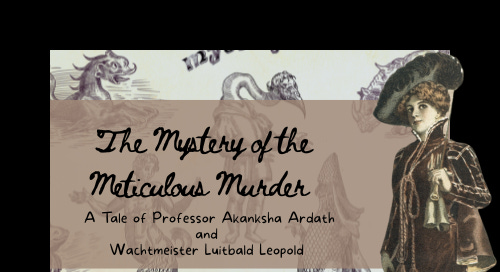The Mystery of the Meticulous Murder Chapter I
A Tale of Professor Akanksha Ardath and Wachtmeister Luitbald Leopold
“The fool is dead,” Professor Ardath announced, speaking in Dutch so as to give my ability to lip read in that language a test.
In honesty I didn’t quite make out her words—Dutch is a new language to me, and one I didn’t speak previous to my deafness--but I had no difficulty reading the telegram she held out to me:
CONSTABLE RORY KILLED
RETURN AT ONCE FOR INQUIRY
Shall I make up the bags? I signed.
“Absolutely not, Herr Luitbald.” Professor Ardath said, dramatically tossing the dregs of her morning tea over the porch railing and into what the English allowed to be called a street in Calcutta. “I’ve told all I have to tell on this affair. It’s they who won’t hear it.” A look of embarrassment flashed across her thin face at this offhanded reference to my condition. “Sorry,” she added.
I could not hear her apology, having lost my hearing and my voice in an artillery barrage when laying siege to Paris as part of the Prussian Army.
After the war, I studied oralism at the Saxon Institute for Mutes in Leipzig. It was there I became reacquainted with Professor Ardath. (We had met briefly during the siege of Paris, at quite different purposes, but that is a tale for another time.)
Professor Ardath had learned sign language from Abbé Charles-Michel de l'Épée and had come to Leipzig to match that learning with the discipline or oralism, called 'lip-reading' in some quarters. She proved a wonderful teacher and soon we could communicate easily and clearly. Delighted with the outcome and in need of a aide, She had taken me on as a secretary and protector. Now, and after years of association, our communication was effortless and comprised several languages. ‘Talk’ came so easily to us now that we could often hold entire conversations without others even being aware we were doing so, which had proved frequently useful in our association.
I say my duties include service as her protector.
From what did the professor need protection? She was a woman travelling in the wilder parts of the earth, and while hazards could range from beasts to storm to savages to thieves, the greatest and most constant hazard was always men.
Soldiers and railway men, vagabonds and policemen, sailors, students and missionaries. Occupation, race and station did not matter if they were of the sort of men to follow whatever evil thoughts came to them.
Professor Ardath was no babe in the woods and could watch after herself in most circumstances -- she had graduated an excellent fencer, and I had taught her how to defend with a saber and how to kill with a dagger.
However, in addition to carrying her luggage and tending to other details of travel, I served to discourage men from getting ideas.
Just the sight of me divorced most men from their wicked thoughts.
I am over six feet tall and have been a soldier for more than half of my life. I had lost my hearing and my speech, yet my back was straight, my shoulders broad and my knuckles bear the cicatrix that comes from administrating punishment rather than receiving it. The lower half of my face is always veiled, to spare other the sight of my disfigurement (a courtesy Professor Ardath has called ‘a vain affectation’).
To be in perfect readiness in service of a woman who climbs into tombs and has been known to trade with bandits and rogues of every continent, I travelled with three longarms, wore two Colt pistols, a Muslim saber and two Spanish daggers, the latter so as to be ready for any aggressor who might persist after being shot.
“Do gather our gear for the morning’s march,” Professor Ardath continued, still speaking in Dutch and taking no pains to enunciate, so I was hard-pressed to make sense of it. Still, the context was apparent and as we weren’t going back to India, I set to work gathering materiel for our morning expedition into the Sundarbans.
The professor’s intention relieved me, for as much as I did not look forward to hiking into the wild mangrove swamps south of Calcutta (doubtless thick with tigers, pirates and sucking mud pits), I had less enthusiasm still for being anyplace near the strange being the dwelled beneath the floors of that thrice-damned hotel on the Hooghly.

Professor Ardath and I had met the ill-fated Constable Rory some weeks ago, while travelling India by train.
The tracks we rode were new, but the trains were old, brought over by the English who were never going to put more into their colonial enterprises than they had to.
These long-neglected engines needed rest, water and fuel with greater urgency than their newer kin, and that meant travel in India required more stops than travel in a more modern region. That day’s unexpected stop to take on water left us in the middle of the long stretch of wilderness that separated the inland territory and the sea. This was a disappointing outcome, and far short of our anticipated goal. However, my employer, Professor Akanksha Ardath, enjoyed these halts and doubtless saw them as every bit as valuable in her research as any departure or arrival could be.
It was late afternoon and the sun that had baked us all day in our cars would soon set. Steam and coal embers blew all around us and I could see from the faces of the other passengers that the whistle was giving a long, punishing cry as the crew struggled to release steam from the engine.
The engineer, an Englishman who had the look of a twice-broiled capon due to the baking he’d received from the engine, was telling us they need the night to get things in order, and in their wisdom, the railroad had bought out a hotel where riders could sleep while, he repeated, things were put in order.
He spoke to Professor Ardath and not I, for it was clear from her appearance and carriage that she was absolutely in charge of any situation she might find herself in. If others failed to recognize this, or perhaps choose to ignore it, that was to their disadvantage, for a wiser and cleverer person than Professor Akanksha Maria Ardath, late of Miskatonic University, had never crossed their paths before and they would likely never see such as her again.
While rooming arrangements were made, we were set upon by three gentlemen, one of whom I had observed on the trains, and the second the constable for the small village, or huey as the English called such a place, and the third, a Scotsman, whom we would soon learn was in charge of the hotel itself.
There were other passengers, perhaps sales agents or workmen with business on the rails of India, but we ignored those fellows and were drawn, as if Professor Ardath’s peculiar gift, to those who would be the most trouble.
Charmed by Professor Ardath’s manner and appearance, the trio insisted that she dine with them, and this was the last thing they agreed upon for many hours.
To Be Continued Next Week
Thank you for reading!






